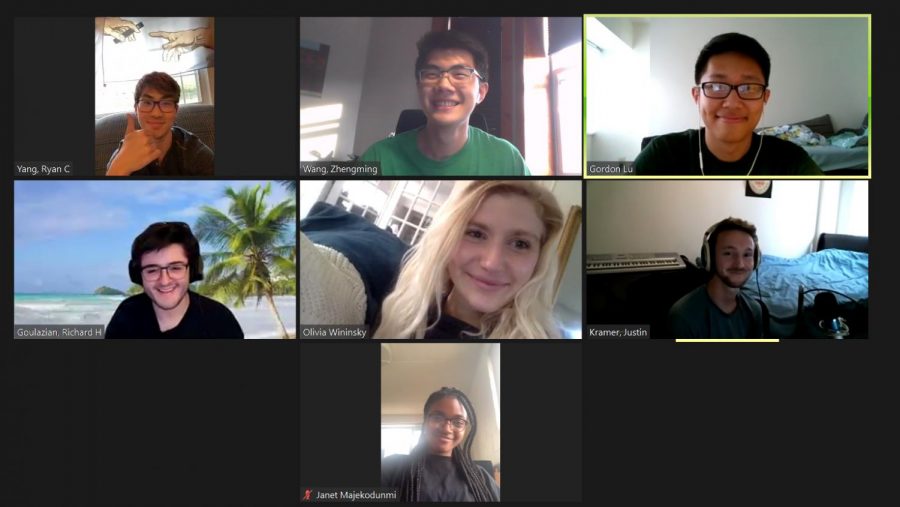Computer Science Club ‘programs’ new ways to connect amid ongoing pandemic
The officers of the Computer Science Club meet on Zoom.
September 6, 2020
Many clubs are still figuring out ways to adapt to a new online format due to the ongoing COVID-19 pandemic. But the Pitt Computer Science Club not only quickly adapted to the unprecedented circumstances, it also evolved and grew stronger, according to Zhengming Wang, the club’s president.
“Thanks to an exceptionally strong operations team, through the first few weeks of the club, we have already managed to have more than 150 members participate in our events and programs,” Wang, a junior computer science major, said. “In a time of economic struggles, our club has been able to increase our budget by nearly 3,000%.”
The pandemic did not halt the development of the club. Instead, club officers faced the challenge head-on and made more progress than they expected with the creation of six new programs to offer help and resources to club members.
Olivia Wininsky, a sophomore computer science and finance double major, serves as the vice president of the club. She said the club has been working on a few projects since April, and she is very excited for the new academic year.
The club’s mission, according to Wininsky, is two-fold — to connect and grow the Pitt computer science community while also providing the resources and opportunities they need to be successful.
Wininsky said the officers have mainly been working on six programs — Zero to Offer, Mentorship, Academic Outreach, Projects Initiative and Competition, the Diversity Initiative and the Company Partnership.
The Zero to Offer program, according to Wininsky, is an internship training program to help students prepare for recruiting at top companies. The club has partnered with officers who have worked or interned at top companies such as Quatrics, Jane Street and Google.
Wang said the idea of the Zero to Offer program came from years of trial and error. The officers wanted the program to appeal to all computer science students, so they came up with a two-track system that helps classify the member’s skill level from beginner to more advanced.
“The purpose of the two-track system is to better tailor benefits, advice and assistance based on the member’s experience. A benefit we’re really excited about is the Zero to Offer Gala,” Wang said. “After the curriculum is complete, all Zero to Offer members will get to network with various companies and recruiters and various awards will also be given out.”
The Mentorship Program focuses on underclassmen and upperclassmen, but Wininsky said the club hopes to include more alumni in the future as well as companies and recruiters to do mock interviews and resumé reviews.
The Academic Outreach program organizes study groups and hosts study sessions with the club’s network of teaching assistants. Wininsky said this is a platform where students don’t have to be afraid to reach out for help.
“They are more like informal office hours or study parties. I know that when I initially came to Pitt, attending office hours with professors and teaching assistants can be intimidating,” Wininsky said. “We wanted to make it less intimidating and provide a platform for more experience to members of our communities and teaching assistants.”
The Projects Initiative is a six-week-long project competition called Computer Science Club Hacks. It encourages underclassmen to work with upperclassmen on projects of their choice. The club would bring in different companies, alumni and professors to give project advice to help students build out their portfolios.
The Company Partnership program connects students with resources. Wininsky said the club officers plan to invite companies to visit and hold info sessions and mock interviews. Previous visits include Uber and Quora from last year. She said many top companies have contacted them and offered to support them.
The Diversity Inclusion project is about including students from all demographics and backgrounds and providing them with the resources and opportunities in their technical journey. Wininsky said this program is not part of current anti-racism efforts at Pitt and around the country, but has actually been around since earlier this year.
“We pitched the school and asked them to help us with the [Diversity Inclusion project] in the middle of May, and that was before everything broke out. We had emphasized that we wanted to focus on diversity, we just didn’t know how much focus it needed to be,” said Wininsky. “It’s interesting because [the protests] have catalyzed what we wanted to do and made our timeline much shorter. We ended up accomplishing more.”
First-year computer science major Caleb Tsai said he joined the club to meet others in his field, since it is harder to meet people now due to the pandemic.
“I really like the mentorship program,” Tsai said. “I’m new to computer science in terms of actual experience, and I want to get involved in the internship process, hackathons, having one-on-one discussions, etc.”
Wang said he hopes to see an increase in the number of club members this year, while at the same time preserving the community’s personable feel.
“[The club] is a community, and with a larger membership base comes the risk of losing the personal touch,” Wang said, “Already with 100 members coming to a meeting, I struggle with recognizing names and faces.”
Tsai joined the Zero to Offer and Mentorship programs and is excited to see how the new programs go. He said he hopes to expand his networks and foster relationships that last into his career.
“I want to be a part of a community that’s both academically and personally rewarding, one where I’m not isolated but learning through others and passing experiences down to the next generation,” Tsai said.



